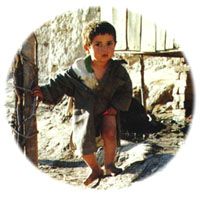
As Afghanistan's new school year officially begins tomorrow (Wednesday) UNICEF's Deputy Executive Director, Ms. Rima Salah, has warned of a continued threat facing Afghan women and children from high rates of child and maternal mortality, low levels of school enrolment and neglect of children's fundamental rights.
Speaking at the start of a week-long visit to Afghanistan, Ms. Salah expressed concern at the health, education and protection status of children and women; an estimated 600 children under the age of five die every day in Afghanistan, mostly due to preventable illnesses, some 50 women die every day due to obstetric complications, less than half of primary school age girls attend classes, while a quarter of primary school age children undertake some form of work, and an estimated one-third of women are married before the age of 18.
According to UNICEF's State of the World's Children Report, Afghanistan has the fourth worst record in under five child mortality, the infant mortality rate being 152 per 1,000 live births.
"With more children in school than ever before in Afghanistan, school gates across Afghanistan will open again tomorrow for a new academic year – but at least one in two girls who should be in classes will remain at home," said Ms. Salah. "One in five children in this country do not survive long enough even to reach school age. Others will drop out of school, to support their families. This is a tragedy that threatens progress made in recent years."
Ms. Salah recognized the recent spate of incidents against schools in some part of Afghanistan as undermining the cause of development. "Attacks against education are attacks against the most basic rights of all Afghan people," she said. "We urge communities and authorities to work together to find ways of ensuring all children enjoy the opportunity to go to school."
Ms. Salah is calling upon the international community to increase support to development programmes for women and children. Congratulating the Government for including key targets for improvements in for child and maternal health and education in the recent Afghanistan Compact, she urged donors to provide the resources needed to meet those goals.
 "Unless the world makes tangible commitments to the Government and people of Afghanistan, increasing investment in core services such as health, education and protection of children, development will continue to be constrained," noted Ms. Salah. "Efforts to reach the Millennium Development Goals will be thwarted unless every Afghan child enjoys a quality basic education, free from abuse and exploitation. These are inalienable rights that we must guarantee."
"Unless the world makes tangible commitments to the Government and people of Afghanistan, increasing investment in core services such as health, education and protection of children, development will continue to be constrained," noted Ms. Salah. "Efforts to reach the Millennium Development Goals will be thwarted unless every Afghan child enjoys a quality basic education, free from abuse and exploitation. These are inalienable rights that we must guarantee."
Ms. Salah will also urge Government and donor representatives to improve outreach of services to Afghanistan's provinces, to reduce disparities between urban and rural communities.
"We have seen so much progress made in recent years, with new institutions in place and stronger policies for women and children, but long-term growth cannot happen if we do not meet our obligations to safeguard health, education and protection," said Ms. Salah. "The children who will flood through those school gates tomorrow, and more importantly those will still remain at home, expect nothing less."



